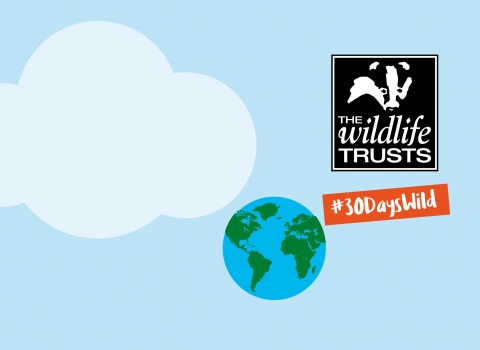Getting wilder by the year
30 Days Wild is back for another year! The Wildlife Trusts’ annual nature challenge; one random wild act a day, for a whole month, kicking off on the 1st of June. The last five years of 30 Days Wild have really helped demonstrate the benefits of getting closer to nature, for health, wellbeing and for the natural world itself. It’s a challenge with something for everyone, from those of us just dipping our toes into nature for the first time, to those that spend every spare moment immersed in the wildness around them.
We could share lots of stats about how a daily dose of nature makes us happier, or more likely to help wildlife (which you could read here if interested). But we think a better way to showcase the magic of 30 Days Wild is by sharing stories from the people that take part. Here are the experiences of just two of the 380,000 people that went wild last June. Neither Jamie nor Gemma were new to 30 Days Wild, but for them each year’s challenge is as exciting as their first.
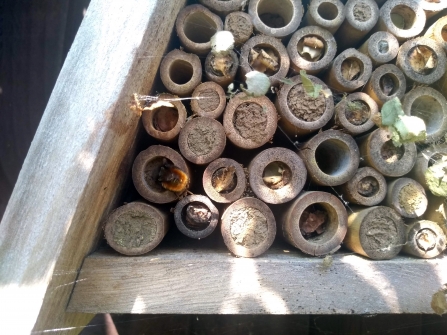
By Sophie Baker
Jamie’s story
Jamie has enjoyed taking part in 30 Days Wild every year since 2015 and does his best to stay wild the whole year round. But despite this constant connection to nature, he still finds 30 Days Wild a helpful way to refresh his relationship with the wild world around him.
“I often take advantage of 30 Days Wild to try new activities, learn something new and inspire others,” Jamie says. “In previous years I have enjoyed activities large and small, from feeding hedgehogs to following slugs, and although some of my wild days took me further afield, it's astonishing how much wildlife you can find to enjoy locally.”
For Jamie, the greatest random acts of wildness are those shared with others. “The best of my 30 Days Wild were spent leading youth groups on activities such as woodland safaris, building habitats for creatures and pond dipping for mini-beasts, or introducing visitors to the wildlife of Loch Lomond and The Trossachs National Park in my role as volunteer ranger. There's nothing better than seeing the curiosity and wonder in a young person when they hold a frog for the first time, knowing that you might have sparked an interest in nature that will last a lifetime.
“That's the thing I love most about 30 Days Wild - the opportunity to share my passion for nature with others, whether that's family, friends, colleagues or getting people hooked through social media. As a psychology graduate, I understand deeply the restorative effects of nature and the outdoors. For me personally, the mental and physical benefits that contact with nature brings are clear and have supported me through stressful and difficult periods.”
Obviously, this year things are a little different, with new challenges to the ways we can connect with nature. “I'll be keeping closer to home than ever,” Jamie says, “and will dedicate my 30 Days Wild towards making my garden as wildlife-friendly as possible. I'm looking forward to trying out some Wildlife Trust activities and seeing what habitats I can create to attract wildlife into my garden.
“I'm especially looking forward to making some small ponds, and feeders to see what birds I can attract. You really don’t have to go far to enjoy your own little patch of wildness, and I can't wait to see how others get involved.
“John Muir said, ‘in every walk with nature one receives far more than he seeks’, and 30 Days Wild offers a brilliant introduction, or reminder, for people of all ages and backgrounds, that connecting with nature in a mindful and caring way is good for mind and body.”
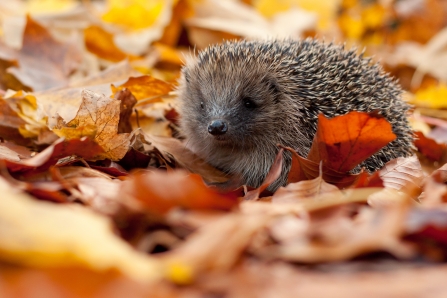
Gemma's Story
Gemma has taken part in 30 Days Wild for the past three years with her nature-loving children: six-year-old son, Thomas, and eight-year-old daughter, Summer. She loves to recycle items and reuse old materials to create nature-themed outdoor furniture or wildlife habitats.
Gemma has always been interested in nature and was inspired by reading about 30 Days Wild on Twitter. “I saw it, took part and was hooked, I love my wildlife. It gave me the best excuse to do those things that I’d been planning to do for ages." Bedtime stories also include wildlife to help wind-down at the end of a busy day; “nature soothes you” adds Gemma.
Part of the appeal is the challenge and fun of finding new ways to connect with your local wildlife. “We love 30 Days Wild,” Gemma says, “and look forward to doing something different each day in the garden or neighbourhood – last year we made a pond out of an old plastic paddling pool which has become home to frogs and a newt. We’ve named our resident blackbird Bert and love to feed him and other visitors to our garden. We also have hedgehogs and even found one snoring under a pile of leaves!”
One of her first projects was to paint an old cable drum as a toadstool and turn it into an outdoor table for her children. The family have also watched foxes nearby and stayed up late with their local hedgehogs. They’ve honed their gardening skills too, growing pumpkins, giant sunflowers, and vegetables, as well as planting a nettle patch for butterflies; all in a garden about 5 metres long by 5 metres wide. As Gemma says, “it shows what you can achieve with only a small space, even in a town.”
Gemma is a lunchtime supervisor at her local school and loves to get the kids interested in nature too, from upcycling projects and to talking to them about what they can see around them. She’s heartened by an increase in the numbers of children now asking her questions about nature and wildlife – “it’s been great getting the kids interested and now others are asking about nature too.”
How does 30 Days Wild help you to connect with nature?
Share your stories on social media using #30DaysWild or email 30dayswild@wildlifetrusts.org.

How to have an eco-Christmas
Whether you celebrate a big family Christmas, or you just give out a few cards to your friends and neighbours to wish them a happy time…
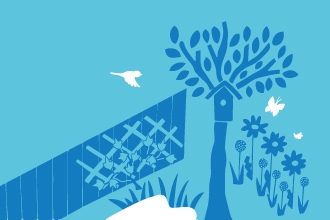
How to start a wildlife garden from scratch
Use the blank canvas of your garden to make a home for wildlife.
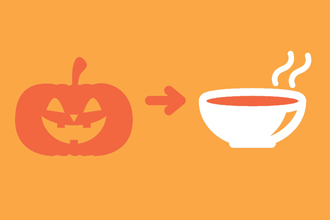
How to have a plastic- free Halloween
Halloween is often a great time for spooky family fun, but unfortunately it is often full of plastic.
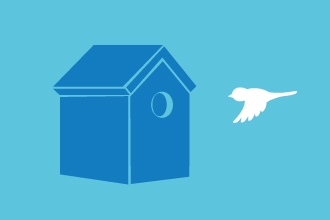
How to build a bird box
With natural nesting sites in decline, adding a nestbox to your garden can make all the difference to your local birds.
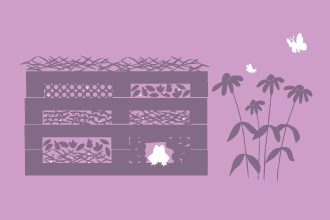
How to build a bug mansion
Build your own bug mansion and attract a multitude of creepy crawlies to your garden.
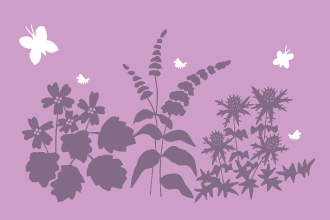
The best plants for bees and pollinators
Set up a ‘nectar café’ by planting flowers for pollinating insects like bees and butterflies


